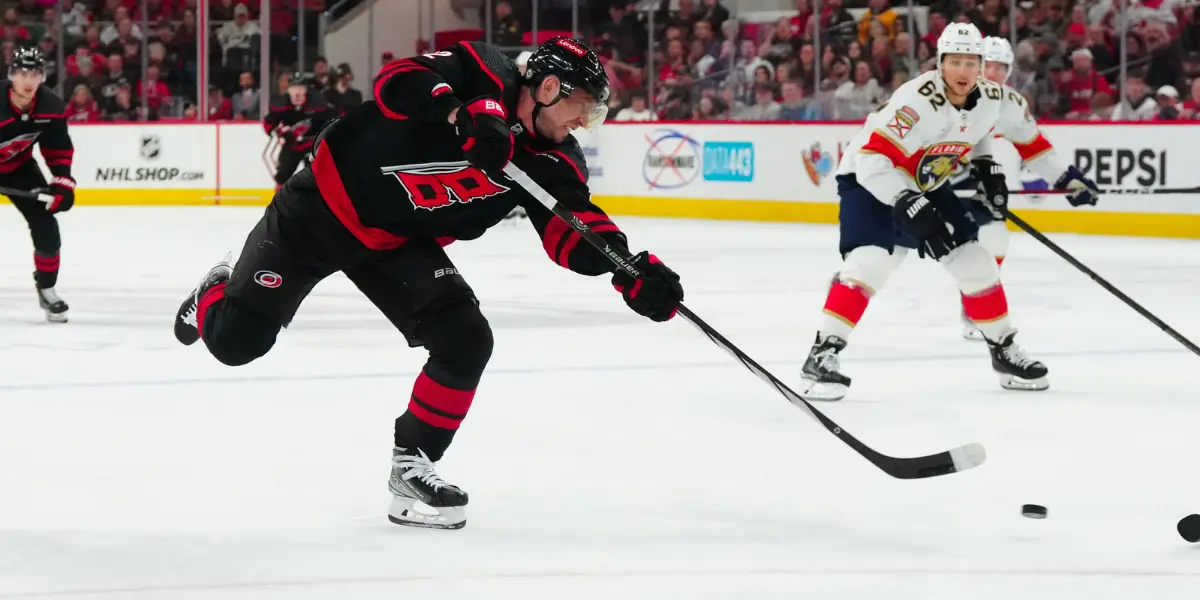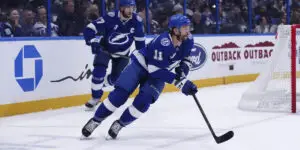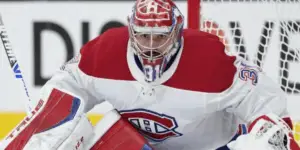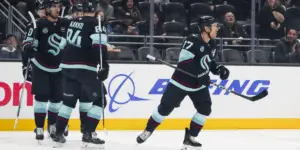
After being signed by the Carolina Hurricanes at the trade deadline, Evgeny Kuznetsov has already positively affected the team beyond his goal last night against the Florida Panthers.
Before his trade, Kuznetsov hadn’t played an NHL game since February 5, 2024. The forward entered the NHL’s Player Assistance Program that same day. After his clearance from the program on March 2nd and his return to Capitals practice, Kuznetsov was waived by the team. On March 8th, he was traded to the Carolina Hurricanes in exchange for a third-round pick in the 2025 draft.
For the Carolina Hurricanes, a team notorious for not making trade moves (hence GM Don Waddell’s famous “We like our team” quote), a trade for Kuznetsov was one fans didn’t expect. The trade with Pittsburgh for Jake Guentzel was expected to be the only major move for the Canes this year. Within less than a week of his signing, Kuznetsov has made an impact for the Canes on and off the ice. Kuznetsov has become a Raleigh hockey media darling through his willingness to speak publicly about his return to hockey and what it means to him. During his postgame report with Bally Sports’ Hanna Yates, Kuznetsov stated that he “hadn’t felt (the support of the Hurricanes organization, fanbase, and city of Raleigh) like that in a long time” and that he is “trying to be (me), enjoy every day, and work hard.”
For hockey fans, Kuznetsov is quickly becoming one of the most well-known Canes players and a fan favorite. The line Guentzel-Kuznetsov-Necas has become a line synonymous with great play. In last night’s postgame interview, Canes right winger Seth Jarvis called the line “great on defense” and “electric.” Kuznetsov’s bird celebration after goals, priorly hated, is now one celebrated. In a video released by the Canes’s Twitter account, coach Rod Brind’amour admits to “hating that bird thing when I had to watch it, but I love it now.” After last night’s Storm Surge, the team surged Kuznetsov while repeating the famous motion.
But there is a double meaning to Kuznetsov’s return. Mental illness and addiction are still highly stigmatized, especially within certain subsets of communities. Despite the rise of more NHL players openly discussing their mental health, such as Clint Malarchuk, Corey Hirsch, and others, the sports world is still one in which anything deemed to be weak is not acceptable on a broader scale. For Kuznetsov to return from the Player Assistance Program, come back into the NHL playing at a high level, and publicly discuss the stigma surrounding addiction and mental health is a major deal. Speaking again to Yates during intermission, Kuznetsov stated that he “was dealing with some big issues, so the support is huge for me” and that he “is living (his) best days and trying to take it day-by-day and take everything that’s possible.” For younger players, fans, and anyone else in the hockey world, the degree of openness Kuznetsov has maintained about coming back to the sport is one demonstrating that it’s okay to talk about the sides of life that aren’t okay. It’s okay not to be okay, as the common saying goes. Speaking out publicly about mental health is hard. Being vulnerable, especially with extra layers of toxic masculinity and hockey culture, is incredibly hard. By destigmatizing mental health and mental health treatment in the hockey world, a greater impact is automatically held. What Kuznetsov has done to do in the public eye is beyond brave – it demonstrates the importance of destigmatizing mental health. Even if Kuznetsov never scores another goal as a Cane, his importance on this franchise is already here, a week after he came to Raleigh.

ITR 49: For Real This Time – Inside The Rink
Discover more from Inside The Rink
Subscribe to get the latest posts sent to your email.



